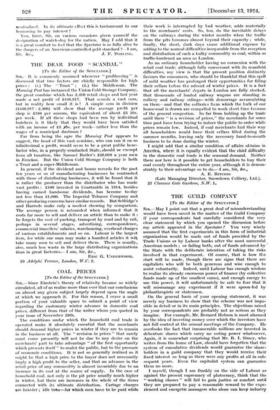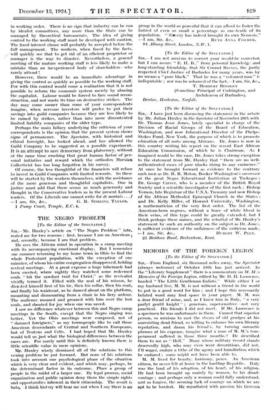THE GUILD COMPANY
[To the Editor of the SPECTATOR.] Snt,—May I point out that a great deal of misunderstanding would have been saved in the matter of the Guild Company if your correspondents had carefully considered the very clear statement by which you opened the discussion before my article appeared in the• Spectator ? You very wisely assumed that the first experiments in this form of industrial organization would be made out of funds provided by the Trade Unions or by Labour banks after the most successful American models ; or failing both, out of funds advanced by the State with the deliberate intention of taking the risks involved in that experiment. Of course, that is how the start will be made, though there are signs that there are capitalists who will be both generous and wise enough to assist voluntarily. Indeed, until Labour has enough wisdom to realize its already enormous power of finance (by collective funds made up of the smallest sums), and enough energy to use this power, it will unfortunately be safe to fear that it will mismanage any experiment if it were spoon-fed by philanthropists or statesmen.
On the general basis of your opening statement, it was merely my business to show that the scheme was not impo- sible in detail or in its main principles. The objections raised by your correspondents are probably not as serious as they imagine. For example, Mr. Bernard Hobson is most alarmed by the idea of investing money over which the investors have not full control at the annual meetings of the Company. He overlooks the fact that innumerable millions are invested in debenture shares which carry no voting power whatsoever. Again, it is somewhat surprising that Mr. R. I. Simey, who writes from the home of Law, should have forgotten that the system of cumulative dividends would guarantee the share holders in a guild company that they would receive their fixed interest so long as there were any profits at all in sub- sequent years. Even the capitalist system can guarantee them no more.
I myself, though I am frankly on the side of Labour as against the present supremacy of plutocracy, think that the " working classes " will fail to gain justice or comfort until they are prepared to pay a reasonable reward to the expe- rienced and energetic managers who alone can keep industry in working order. There is no sign that industry can be run by idealist committees, any more than the State can be managed by theoretical bureaucrats. The idea of giving control to the working staff must be developed with caution. The fixed interest clause will probably be accepted before the full management. The workers, when faced by the facts; will quickly see that to get rid of an efficient proprietor or ' manager is the way to disaster. Nevertheless, a general meeting of the mature working staff is less likely to make a mistake than an inexperienced body of shareholders—who rarely attend However, there would be an immediate advantage in giving the control as quickly as possible to the working staff. For with this control would come a realization that it is not possible to reform the economic system merely by abusing the capitalist. Labour would be forced to face sound recon- struction, and not waste its time on destructive strikes. The day may come sooner than some of your correspondents imagine, when nervous investors will prefer to put their savings into guild companies because they arc less likely to be ruined by strikes, rather than into more discontented limited liability companies of the older type.
Perhaps the main fallacy underlying the criticism of your correspondents is the opinion that the present system shows• signs of permanence. The Spectator, with historical and • ethical foresight, has looked ahead, and has allowed the Guild Company to be suggested as a possible experiment. It is an attempt to save democracy from plutocracy, without at the same time crushing that great human factor Of per- sonal initiative and reward which the orthodox Martian Collectivist has too long forgotten in his survey.
• Of course, the less thoughtful of the financiers will refuse to invest in Guild Companies with limited rewards. So these will be started by the workers themselves, with the assistance of the more generous and thoughtful capitalists. One in justice must add that there seems as much generosity and thought in the Conservative leaders as in the present Labour leaders. Of the Liberals one cannot write for de mortuis .. .1



























































 Previous page
Previous page